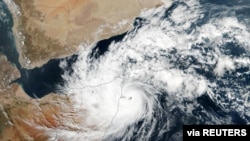A cyclone that hit parts of Somalia this week killed eight people and displaced thousands, flooded farmlands and could worsen a locust plague, an official and U.N. agencies said.
The U.N. Office for the Coordination of Humanitarian Affairs (UNOCHA) said Thursday that Tropical Cyclone Gati made landfall in the semiautonomous Puntland region Sunday and subsided Tuesday, but moderate and light rain continued to fall.
The cyclone killed eight Yemeni fishermen, Mohamed Yusuf Boli, commissioner for the coastal district of Hafun, told Reuters.
"It also destroyed many boats and houses. The town is in water and in bad situation," Boli added.
In addition to the deaths, UNOCHA said the cyclone had displaced 42,000 people from their homes.
"The cyclone has disrupted livelihoods by destroying fishing gear, killing livestock, and flooding agricultural land and crops," the agency said in a report.
The U.N. Food and Agriculture Organization (FAO) said earlier this week that the cyclone could also allow immature desert locust swarms in Hargeisa and Jigjiga in Ethiopia to mature faster and lay eggs.
The effect of the cyclone could also allow the swarms to move southeast to Ogaden region and lay eggs there, too, the FAO said.
The insect plague hitting Somalia is part of a once-in-a-generation succession of swarms that have swept across East Africa and the Red Sea region since late 2019, driven by unusual weather patterns.







